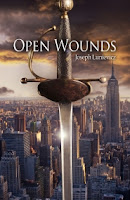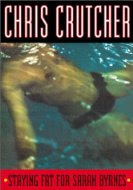 Lunievicz, Joseph. Open Wounds. Lodi, NJ: Westside Books, 2011. Print.
Lunievicz, Joseph. Open Wounds. Lodi, NJ: Westside Books, 2011. Print.[Book cover credit: lunievicz.com/open-wounds/]
Booktalk:
"The bells of hell go ting-a-ling-a-lingCid has always been the kid nobody wants. His mother died when he was born, leaving him with a father who could never forgive him for his fatal birth and a grandmother who could never forgive him for his Jewish mother. When he inevitably gets left at an orphanage, he thinks he'll be there forever. A man like Lefty, a cousin he never knew existed, is the last person he'd expect to claim him.
For you but not for me"
...
I met my cousin on the street. Sister Bernadette closed the front door behind me, her parting words echoing in my ears. "Mr. Leftingsham is your guardian by law of the state and by law of the Lord, Cedric. You are ours no longer. May the Lord be with you."
p.88-9*
Review:
Cid's already lived a rough life by the time Lefty takes him from the orphanage. He's spent most of his childhood as his father and grandmother's punching bag, watched most of his neighbors be evicted from their homes, watched his grandmother kill herself to avoid the same, been taken in to a loving home and then left behind. And that's all before he really even hits teenage-hood (and before we hit the 100 page mark). But that's not to say that it's all bad. Cid has two great best friends, Siggy and Tomik, and he goes to the movies, "church," with his grandmother every Saturday. And out of that comes Cid's dream of becoming a fencer.
The bright and the horrible are wonderfully balanced in these opening pages. You never quite forget one while you're reading about the other. And they set things up perfectly for Lefty's grand entrance. The Great War left him horribly disfigured, crippled, and cranky, but life with him gives Cid opportunities he never would have had otherwise. Together they form a little family (aawww - but not that obvious. Lefty and Cid are both way too tough for all that), but more importantly, Lefty sets Cid up with daily fencing lessons with the crazy, drunk Russian on the roof. Once Nikolai gets involved, Open Wounds quickly becomes a sports book. There's training and fighting and sore muscles and exhausted bodies. But there's also stage-fighting with a Shakespeare company, a cute girl, a reunion with Siggy and Tomik, and the reappearance of their childhood bullies. Again, the beautiful balance. There wasn't so much plot that the fencing stopped being important, but at the same time, I never felt lost in a book centered around the practice of a sport I've only seen in movies.
Now, I don't read a lot of fencing books (though I'm considerably more interested in them now), but I do read a lot of ballet books. I always try to comment on the accuracy of the dancing or the attitudes towards it. I can't do that here, but Richie can (sorry, his site doesn't do direct links). If he says Open Wounds is good, you can bet that it is and that the swordplay therein is up to par (and he does). This will be a hit with readers who are looking for sports books, but historical fiction and hard-knock-life fans will love it as well.
Open Wounds comes out May 25!
Book source: ARC provided by the publisher.
*Quotes and page numbers are from an uncorrected proof and may not match the published copy.
Links to Amazon.com may be affiliate links for the Amazon Associates program. If you buy something through this link, I may receive a referral fee.








